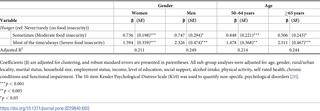PLOS ONE ( IF 2.9 ) Pub Date : 2020-03-31 , DOI: 10.1371/journal.pone.0229840 Razak M Gyasi 1 , Bernard Obeng 2 , Joseph Y Yeboah 3

|
Background
Hunger frequently and persistently occur in older populations in low-income countries especially in sub-Sahara Africa. The aim of this study was to examine the associations between food insecurity with hunger and psychological distress among older people in Ghana.
Methods
A total of 1200 individuals aged ≥50 years were recruited during 2016/2017 Ageing, Health, Psychological Well-being and Health-seeking Behavior Study. Associations between psychological distress (assessed with the Kessler Psychological Distress Scale) and hunger (assessed with a 30-day subjective scale) were evaluated using linear regression modeling.
Results
The overall prevalence of food insecurity was 36% with approximately 27% and 9% respectively for moderate and severe levels of hunger whilst the mean score of psychological distress was 9.5 (±4.10). Persons experiencing moderate hunger (β = 0.71, SE = 0.160, p < 0.001) and severe hunger (β = 1.81, SE = 0.280, p < 0.001) significantly reported increased psychological distress outcome compared to those without hunger. These associations varied between women (β = 1.59, SE = 0.359 p < 0.001) and men (β = 2.33, SE = 0.474, p < 0.001) as well as 50–64 age group (β = 1.48, SE = 0.368, p < 0.005) and 65+ age group (β = 2.51, SE = 0.467, p < 0.001).
Conclusions
The results suggest that experiencing hunger is associated with psychological distress and the effect may be aggravated with advancing age and in men. These findings may inform social policy initiatives and health programmatic interventions for older people exposed to food insecurity.
中文翻译:

粮食不安全和饥饿对社区老年人精神困扰的影响。
背景
在低收入国家,尤其是撒哈拉以南非洲国家,老年人口经常且持续地遭受饥饿。本研究的目的是调查加纳老年人的粮食不安全与饥饿和心理困扰之间的关联。
方法
2016/2017年老龄化、健康、心理健康和寻求健康行为研究共招募了1200名年龄≥50岁的个体。使用线性回归模型评估心理困扰(使用凯斯勒心理困扰量表评估)和饥饿(使用 30 天主观量表评估)之间的关联。
结果
粮食不安全的总体发生率为 36%,其中中度和重度饥饿分别约为 27% 和 9%,而心理困扰的平均得分为 9.5 (±4.10)。与没有饥饿的人相比,经历中度饥饿(β = 0.71,SE = 0.160, p < 0.001)和严重饥饿(β = 1.81,SE = 0.280, p < 0.001)的人显着报告心理困扰结果增加。这些关联在女性(β = 1.59,SE = 0.359 p < 0.001)和男性(β = 2.33,SE = 0.474, p < 0.001)以及 50-64 岁年龄组(β = 1.48,SE = 0.368, p < 0.005) 和 65+ 年龄组 (β = 2.51, SE = 0.467, p < 0.001)。
结论
研究结果表明,经历饥饿与心理困扰有关,而且这种影响可能会随着年龄的增长而加剧,尤其是在男性中。这些发现可能为面临粮食不安全的老年人的社会政策举措和健康规划干预措施提供信息。











































 京公网安备 11010802027423号
京公网安备 11010802027423号